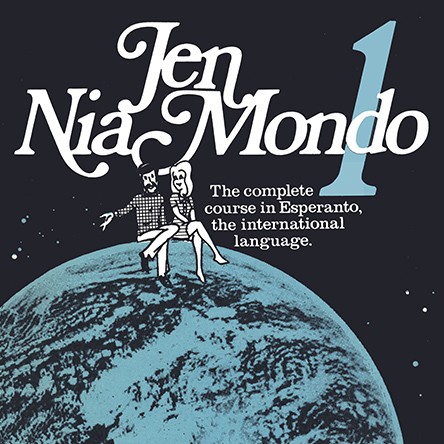
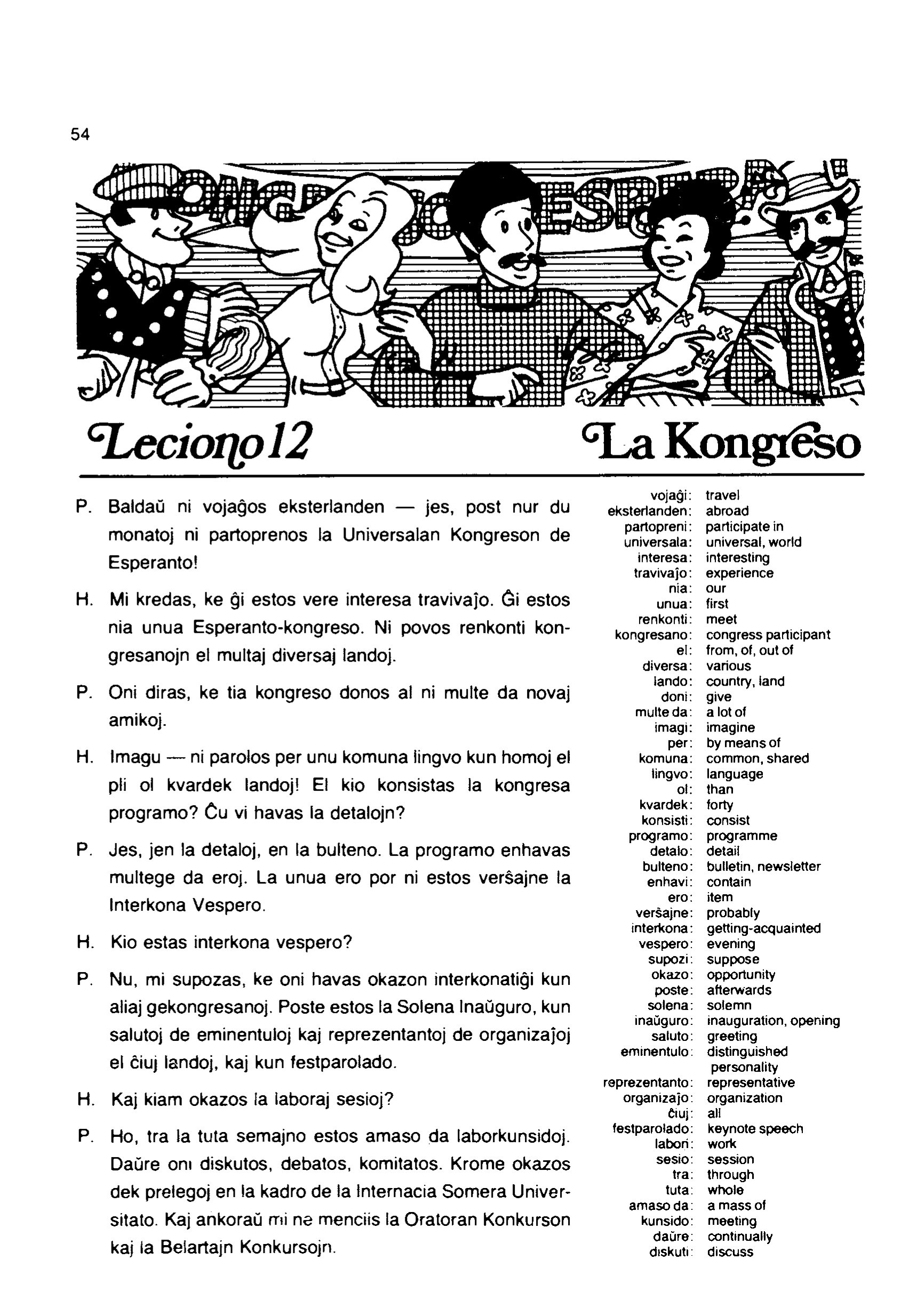
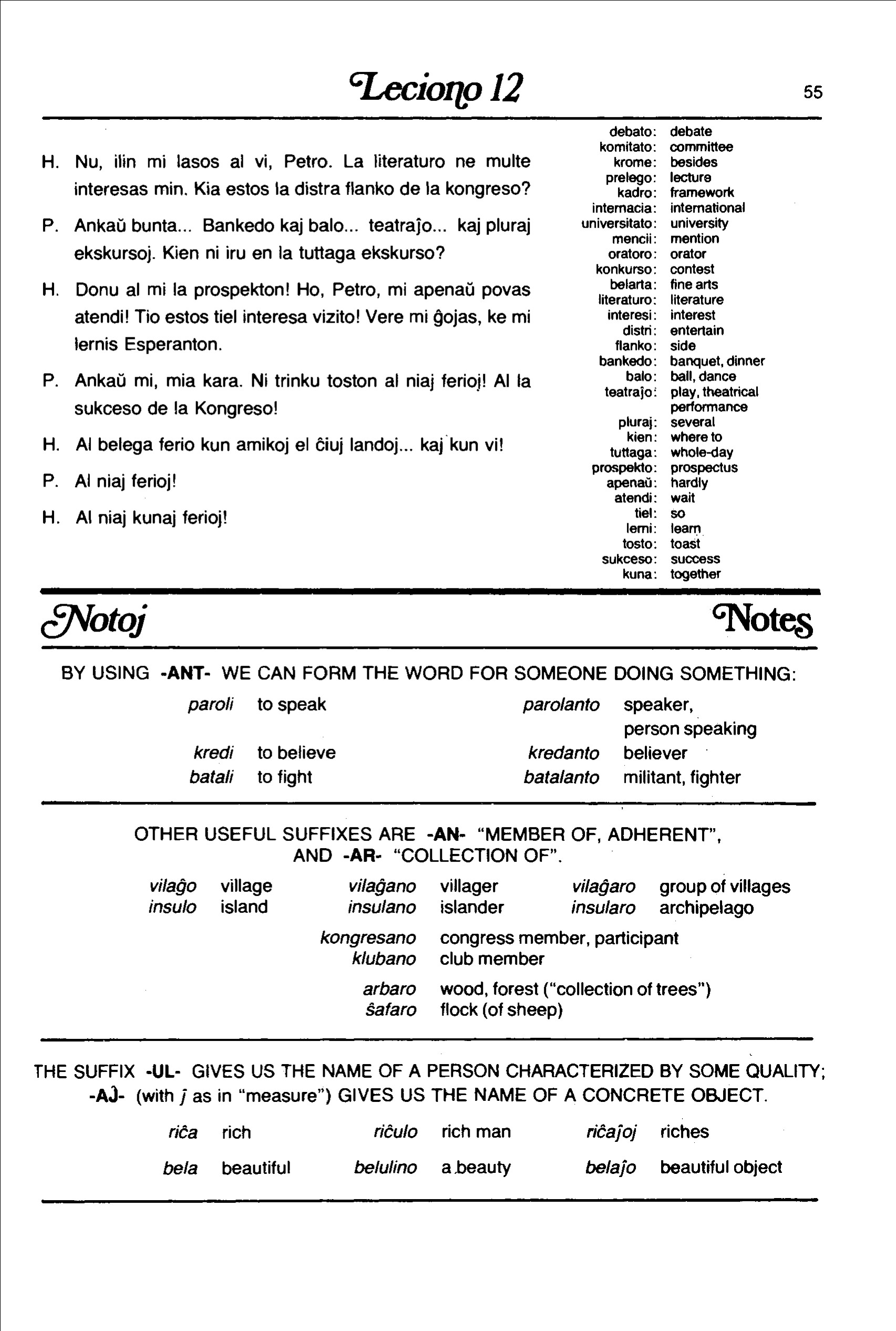
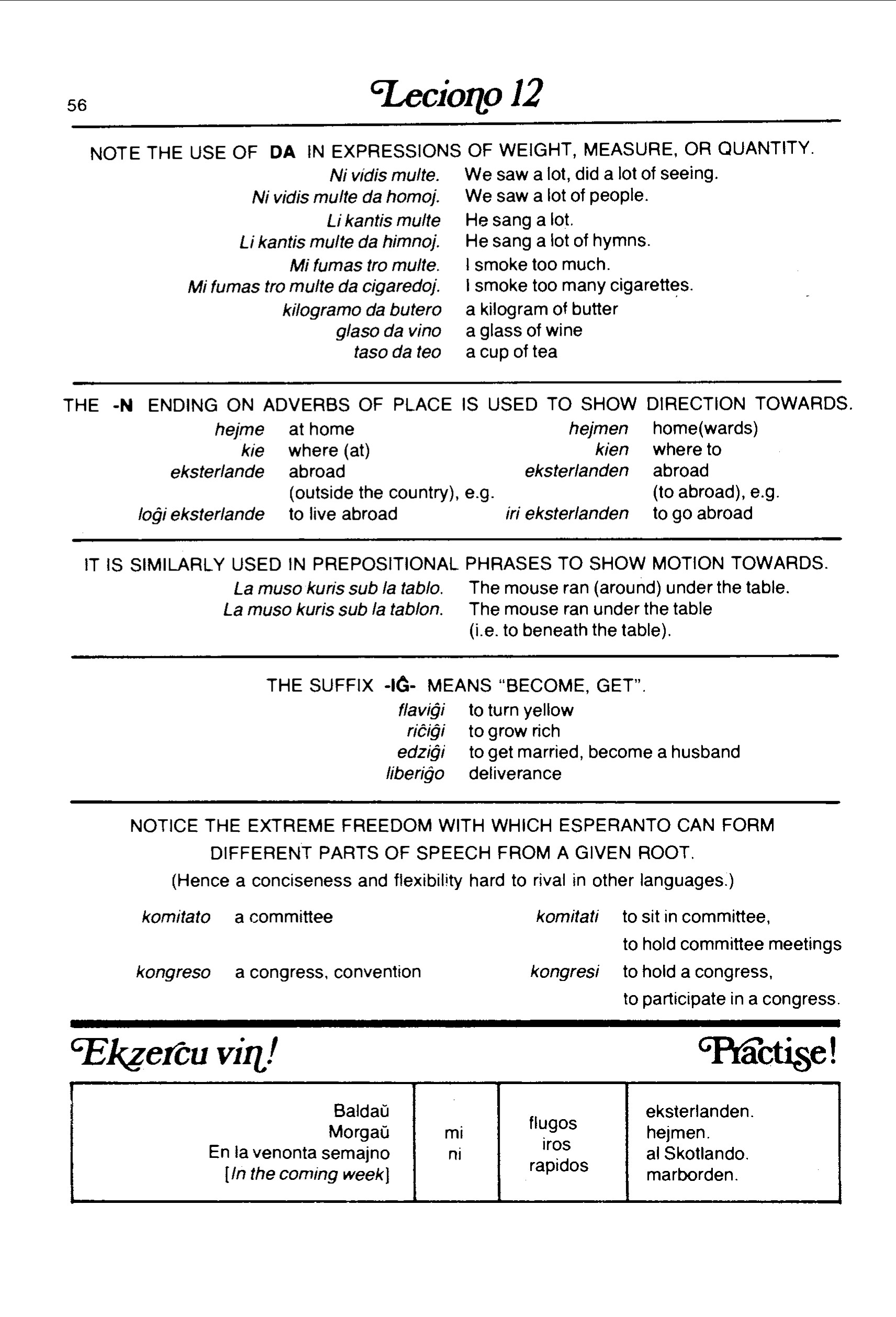
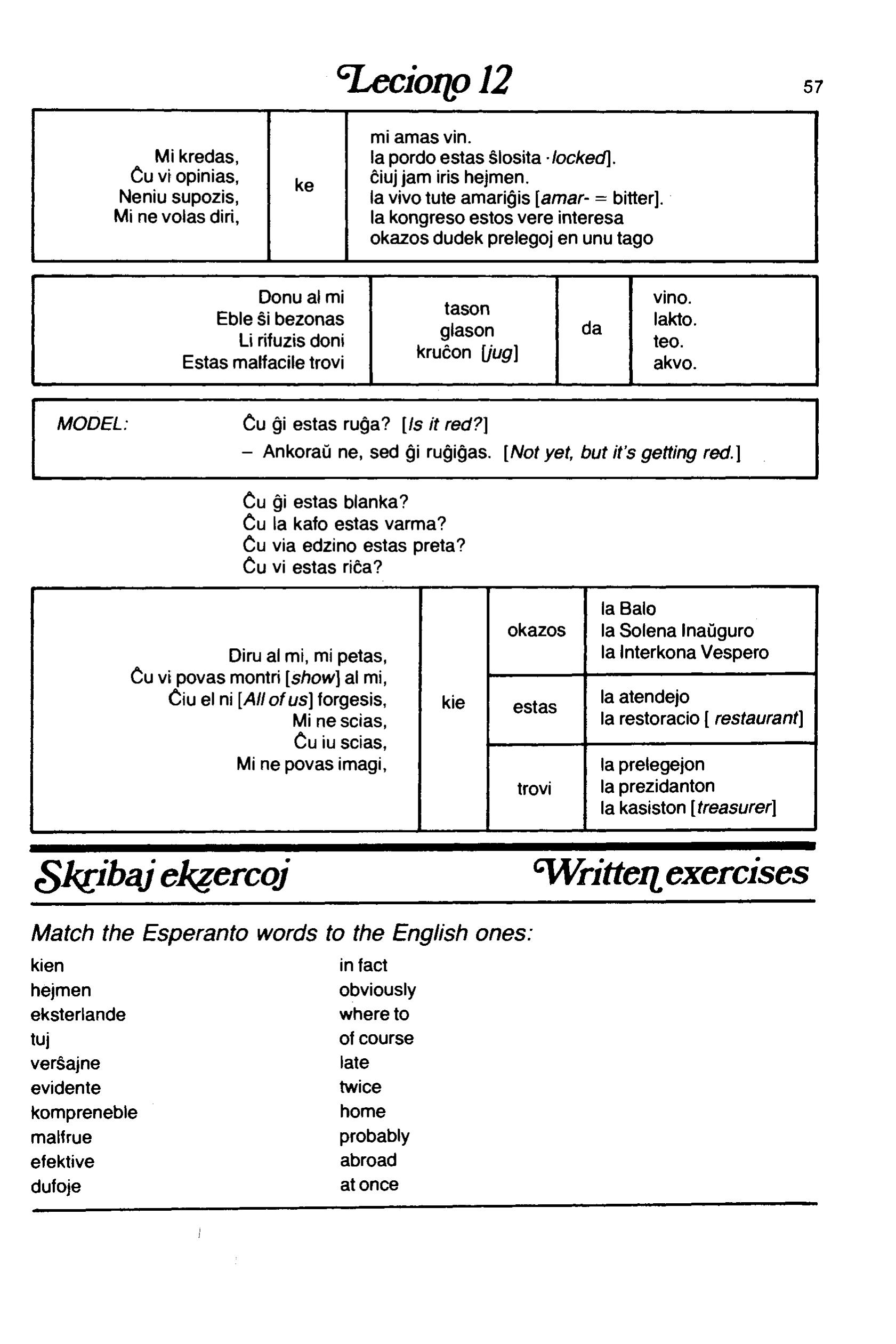
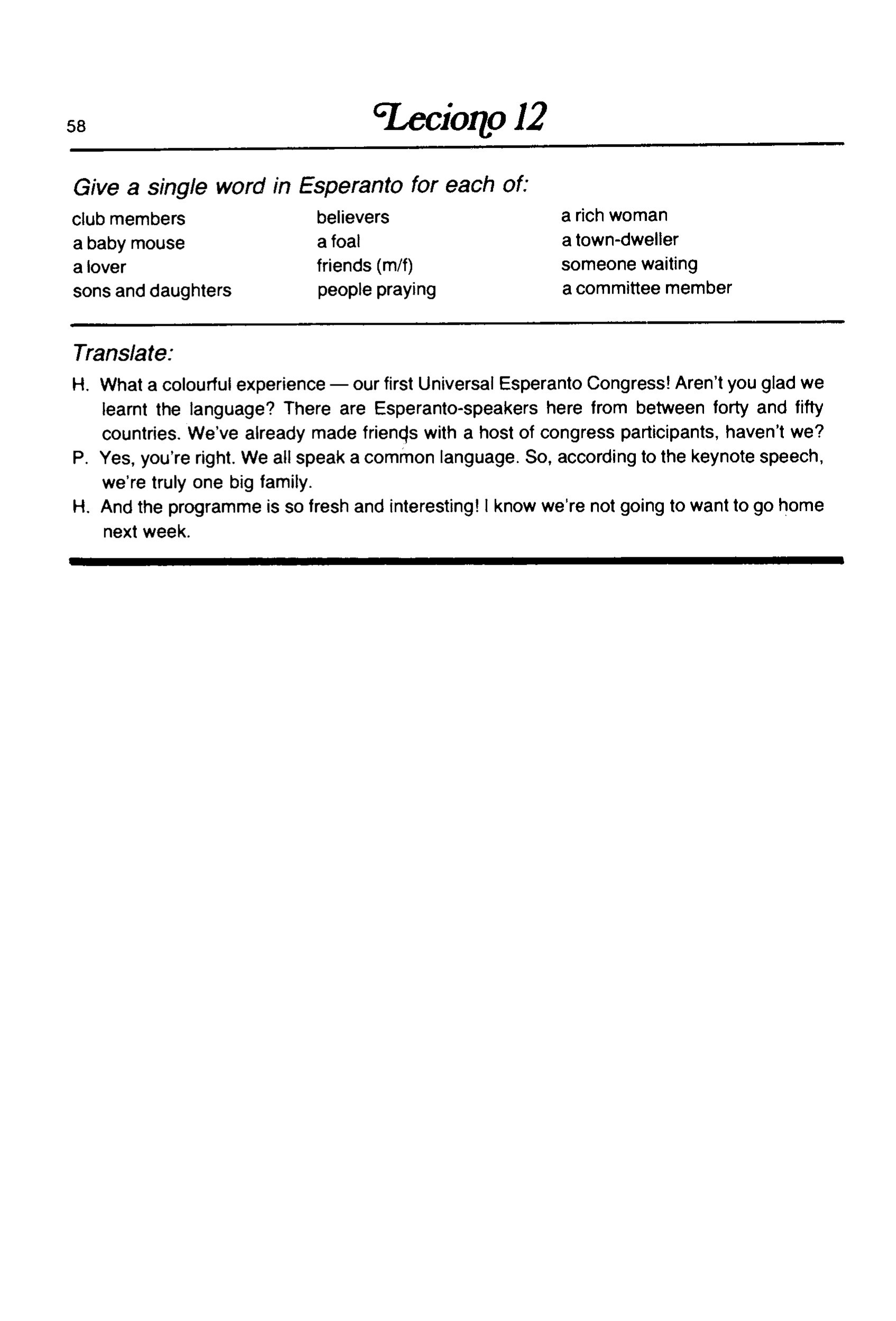

Sample Answers are offered below
Please attempt the exercises before consulting the material below. The consolidated vocabulary list for this lesson may assist you.
Lesson 12 Answers
Page 56
Ekzercu vin! – Exercise yourself!
Baldaŭ mi flugos eksterlanden – Soon I’ll fly aboard
Morgaŭ mi iros hejmen – Tomorrow I’ll be going homewards.
En la venonta semajno ni rapidos al Skotlando – in the week coming we’ll be hurrying to Scotland.
Baldaŭ mi iros marborden – Soon I’ll go to the seaside.
Page 57
Note: On the use of commas below, see the note following the exercise. For the sake of clarity Esperanto never omits ‘ke‘.
Mi kredas, ke la pordo estas ŝlosita – I believe the door is locked.
Ĉu vi opinias, ke mi amas vin – Do you think I love you?
Neniu supozis, ke la vivo tute amariĝis. Nobody supposes life has become totally bitter
Mi ne volas diri, ke la kongreso estos vere interesa – I am not willing to say the congress will be truly interesting.
Mi kredas, ke okazos dudek prelegoj en unu tago – I believe twenty lectures will take place in one day.
Neniu supozis, ke ĉiuj jam iris hejmen – No-one supposed everyone had already gone home.
Donu al mi tason da teo – Give me a cup of tea
Eble ŝi bezonas glason da vino – Maybe she needs a glass of wine. (Note: it may not be in a wine glass!)
Li rifuzis doni kruĉon da akvo – He refused to give a jug of water.
Estas malfacile trovi tason da lakto – It’s hard to find a cup of milk.
Ĉu ĝi estas blanka? Ankoraŭ ne, sed ĝi blankiĝas – Is it white? Not yet, but it’s turning white.
Ĉu la kato estas varma? Ankoraŭ ne, sed ĝi varmiĝas – Is the cat warm? Not yet, but it is warming up.
Ĉu via edzino estas preta? Ankoraŭ ne, sed ŝi pretiĝas? Is your wife ready? Not yet, but she is getting ready.
Ĉu vi estas riĉa? Ankoraŭ ne, sed mi riĉiĝas Are you rich? Not yet, but I am getting richer.
Diru al mi, mi petas, kie okazos la Balo Tell me please where the Ball will be [taking take]
Ĉu vi povas montri al mi, kie okazos la Solena Inaŭguro? Can you show me where the Solemn Inauguration (Official Opening) will be taking place?
Ĉiu el ni forgesis, kie estas la Interkona Vespero? – Everyone of us has forgotten where the Getting-to-Know-You-Evening is
Mi ne scias, kie estas la atendejo – I do not know where the waiting area is.
Ĉu iu scias, kie estas la restoracio? – Does anyone know where the restaurant is?
Mi ne povas imagi, kie trovi la prelegejon? I can’t image where to find the lecture room?
Diru la mi, mi petas, kie trovi la prezidanton – Tell me please where to find the president.
Mi ne scias, kie trovi la kasiston – I do not know where to find the treasurer.
Note: although there is no strict rule, Esperanto prefers to introduce with a comma any subordinate sentence beginning with words such as ‘ke‘ and ‘kie‘. As usual the advice is to err on the side of clarity.
Skribaj Ekzercoj – Writing Exercises
kien – where to / whither hejmen – home(wards) eksterlande – abroad tuj – at once (immediately) verŝajne – probably evidente – obviously kompreneble – of course malfrue – late efektive – in fact dufoje – twice {L4}
Page 58
klubanoj – club members kredantoj – believers a rich woman – riĉulino musido – baby mouse ĉevalido – foal urbano – town-dweller amanto – lover geamikoj – friends (m/f) atendanto – someone waiting (not a ‘waiter!) gefiloj – sons and daiuĝters preĝantoj – people praying komitatano – committee member
Translate / Traduku
H. Kia bunta travivaĵo – nia unua Universala Esperanto-Kongreso! Ĉu vi ne ĝojas, ke ni lernis la lingvon? Estas Esperanto-parolantoj ĉi tie el inter kvardek kaj kvindek landoj. Ni jam amikiĝis kun amaso de kongres-partoprenantoj, ĉu ne?
P. Jes, vi pravas. Ni ĉiuj parolas komunan lingvon. Do, laŭ la festparolado ni estas vere unu granda familio.
H. Kaj la programo estas tiel freŝa kja interesa! Mi scias, ke ni ne volos iri hejmen en la venonta semajno / venontsemajne.
Lesson 12 Here is a list of words introduced in this lesson
Aĵo
Amar/a
Amas/o
Ano
Apenaŭ
Aro
Art/o
Bal/o
Banked/o
Batal/i
Bulten/o
Cigared/o
Da
Daŭr/i
Debat/o
Detal/o
Diskut/i
Distr/i
Divers/aj
Ekster/lande
El
Eminent/a
Enhav/i
Er/o
Fest/i
Festparolad/o
Fum/i
Himn/o
Iĝi
Imag/i
Inaŭgur/o
Insul/o
Interkon/a
Interkonatiĝ/i
Internaci/a
Interes/i
Kadr/o
Kas/o
Kasist/o
Kien
Kilogram/o
Klub/o
Komitat/o
Komun/a
Kon/i
Konkurs/o
Konsist/i
Concrete object
Bitter
Mass/heap
Member, adherent
Scarcely
Group, collection
Art
Ball/ dance
Banquet
Fight
Bulletin
Cigarette
(see lessons)
Last, continue
Debate
Detail
Discuss
Entertain
Various
Abroad
Out of, from
distinguished
Contain
Item
Celebrate
Speech
Smoke
Hymn
Become
Imagine
Inauguration
Island
Get-to-know-you
Get to know one another
international
To interest
Frame (work)
Till
Treasurer
Whereto
Kilogram
Club
Committee
Common, shared
Be acquainted with
Contest
Consist
Krom
Krome
Kruĉo
Kunsid/o
Kvardek
Land/o
Lingv/o
Literatur/o
Menci/i
Montr/i
Multe da
Mus/o
Okaz/o
Ol
Orator/o
Organiz/i
Part/o
Partopren/i
Plur/aj
Preleg/o
Program/o
Prospekto
Renkont/i
Reprezent/i
Restoracio
Sesi/o
Skot/o
Skotlando
Solen/a
Sub
Sukces/i
Supoz/i
Ŝlos/i
Teatr/o
Teatraĵo
Tiel
Tost/o
Tra
Travivaĵo
Tuttaga
Ulo
Universal/a
Universitat/o
Verŝajne
Vilaĝ/o
Vojaĝ/as
Aside from, except
Besides, in addition
Jug
Meeting
Forty
Country, land
Language
Literature
Mention
Show
A lot of
Mouse
Occasion, opportunity
Than
Orator
organise
part
Participate
Several
Lecture
programme
Prospectus, brochure
Meet
Represent
Restaurant
Session
Scot
Scotland
Solemn
Under
Succeed
suppose
Lock
Theatre
Play
So
Toast (in drink)
Through
Experience
Whole-day
Person characterised by quality
Universal, world
University
probably
Village
Travel